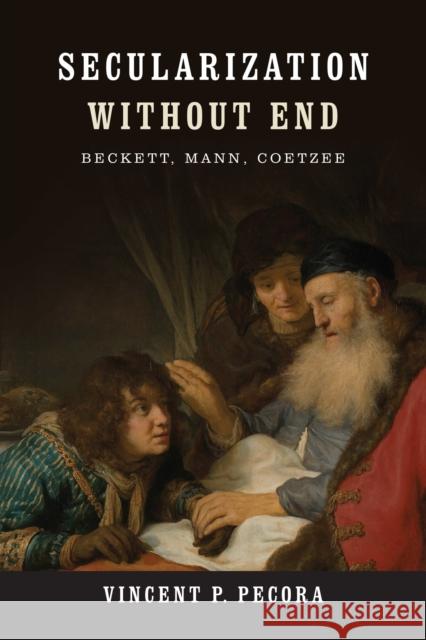Secularization Without End: Beckett, Mann, Coetzee » książka
Secularization Without End: Beckett, Mann, Coetzee
ISBN-13: 9780268038991 / Angielski / Miękka / 2015 / 232 str.
In Secularization without End: Beckett, Mann, Coetzee, Vincent P. Pecora elaborates an alternative history of the twentieth-century Western novel that explains the resurgence of Christian theological ideas. Standard accounts of secularization in the novel assume the gradual disappearance of religious themes through processes typically described as rationalization: philosophy and science replace faith. Pecora shows, however, that in the modern novels he examines, "secularization" ceases to mean emancipation from the prescientific ignorance or enchantment commonly associated with belief and signifies instead the shameful state of a humanity bereft of grace and undeserving of redemption.
His book focuses on the unpredictable and paradoxical rediscovery of theological perspectives in otherwise secular novels after 1945. The narratives he analyzes are all seemingly godless in their overt points of view, from Samuel Beckett's Murphy to Thomas Mann's Doktor Faustus to J. M. Coetzee's The Childhood of Jesus. But, Pecora argues, these novels wind up producing varieties of religious doctrine drawn from Augustinian and Calvinist claims about primordial guilt and the impotence of human will. In the most artfully imaginative ways possible, Beckett, Mann, and Coetzee resist the apparently inevitable plot that so many others have constructed for the history of the novel, by which human existence is reduced to mundane and meaningless routines and nothing more. Instead, their writing invokes a religious past that turns secular modernity, and the novel itself, inside out. "Secularization without End is a well-argued and provocative exploration of the modern novel grounded in a compelling set of theological reflections. Vincent P. Pecora discusses primarily Samuel Beckett's trilogy (1950), Thomas Mann's Dr. Faustus (1947), and various novels by J. M. Coetzee from the late twentieth and early twenty-first century. This is not just a set of three individual-author essays; it is about an alternative history of the novel that challenges the paradigms that have prevailed from Watt to Moretti." --Russell Berman, Walter A. Haas Professor in the Humanities, Stanford University "A must read. After Vincent P. Pecora's Secularization without End, modernism won't be the same. On the back of his innovative understanding of secularization as interminable, Pecora shows that his authors--Beckett, Mann, and Coetzee--are saturated in a bleak Christianity that they can't overcome. I can think of few recent books of literary criticism from which I have learnt more." --Simon During, University of Queensland "Vincent P. Pecora's new study offers a most welcome corrective to the still widely accepted notion that the European novel had 'come to supplant the history of religion as the basis of our moral sensibility.' Compact, accessible, and full of engaging and trenchant commentary, Secularization without End provides a valuable resource not just for specialists but for undergraduates studying the modern novel and trying to develop a nuanced and capacious understanding of the complex relationship between literature and religion." --Thomas Pfau, author of Minding the Modern: Human Agency, Intellectual Traditions, and Responsible Knowledge










